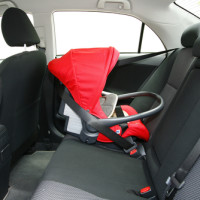Rear-Facing Car Seats Are Mostly Safe for Infants, But They Could Be Made Safer

A study recently reported in the Journal of Traffic Injury Prevention (click to read abstract) looked into the safety of rear-facing car seats in the event of a rear-end collision. While the study authors do not recommend that parents stop using rear-facing seats for infants (and Kentucky law requires them for infants up to one year old and 20 pounds), serious safety concerns were raised by the study, along with specific recommendations about how to make the seats safer.
The problem identified by the study authors, who are biomechanical safety experts who routinely testify in car accident injury lawsuits, is that in a rear-end crash, the rear-facing seat tends to pitch forward in the direction the child is facing, causing the child to hit the back seat and suffer serious head injury. The study authors compared the degree of injury caused when using the car’s built-in seatbelts to secure the car seat versus the LATCH (Lower Anchors and Tethers for Children) anchors found on nearly every car seat and most vehicles manufactured after 2002. Surprisingly, the study found that injuries were greater when the LATCH anchors were used to secure the car seat as opposed to using the car’s seatbelts.
The study’s authors stress that rear-facing car seats are still the safest mode for transporting infants and young toddlers overall. The authors did reveal how the rear-facing seats could be made safer by installing a tether on the floor of the car that runs to the top of the car seat, to keep the seat from pitching forward in a rear-end crash. Cars manufactured and sold in Sweden currently employ this safety feature, so the idea is not out of reach of car makers today.
The Kentucky Transportation Cabinet requires rear-facing car seats for children up to one year old and 20 pounds, and further recommends continuing with a rear-facing seat until the child is two years old and 30 pounds. More child seat safety facts and tips on how to use them properly from the Office of Highway Safety can be found here.
If you or a loved one are hurt in a tragic car accident in central Kentucky, contact Davis & Haymond, P.S.C. at 859-624-3380 (Richmond) or 606-726-9991 (Irvine) to help get the compensation you need to deal with the aftermath of the crash.






